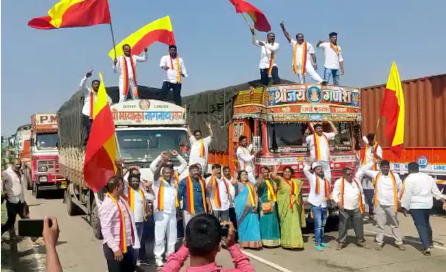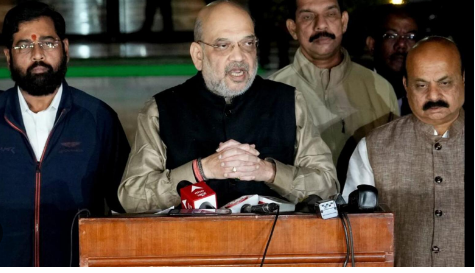
In a major political and administrative development, the Maharashtra government has announced a significant overhaul of its high-level committee that was originally formed to address the long-standing border dispute with Karnataka. The decision comes at a time when tensions between the two states are once again escalating, especially over the contentious region of Belagavi, which both Maharashtra and Karnataka claim as part of their territory. By revamping the committee, Maharashtra aims to strengthen its legal, administrative, and political strategy concerning the decades-old issue that has remained unresolved since the 1950s.
The renewed focus by Maharashtra suggests a strong desire to adopt a more aggressive yet structured approach to securing its claims. The move has reignited debates in political and civil circles about state boundaries, linguistic identities, and the future of Marathi-speaking communities living in the disputed areas. It is also being seen as an attempt by the Maharashtra government to send a clear message ahead of the next round of elections, while simultaneously seeking a stronger stance in the ongoing legal battle in the Supreme Court of India.
The Historical Background of the Maharashtra-Karnataka Border Dispute
The origins of the Maharashtra-Karnataka border dispute can be traced back to the States Reorganisation Act of 1956, which aimed to redraw state boundaries based on the majority language spoken in various regions. However, this move triggered several disputes across the country, with the most intense and prolonged one emerging between Maharashtra and Karnataka (then Bombay and Mysore states, respectively).
The bone of contention has always been the Belagavi (formerly Belgaum) district, along with a few other regions such as Karwar, Nipani, and Khanapur, where there exists a sizable Marathi-speaking population. Maharashtra has consistently claimed that these areas should be merged into its territory as the cultural and linguistic makeup aligns more with its identity. On the other hand, Karnataka has refused to entertain these demands, asserting that the region has been rightfully a part of its state as per the legal demarcations approved by the Parliament.
In 2004, Maharashtra escalated the issue to the Supreme Court, filing a case that challenged the legitimacy of the territorial boundaries defined by the Reorganisation Act. The case has been pending for over two decades, with both sides submitting arguments, reports, and evidence supporting their respective claims.
The Newly Reconstituted Committee: A Strategic Move by Maharashtra
In June 2025, the Eknath Shinde-led Maharashtra government took a bold step by reconstituting the committee responsible for advising the state on matters related to the border dispute. This new committee includes retired Supreme Court judges, senior bureaucrats, legal experts, and key political leaders from the ruling alliance. The primary objective of this move is to bolster Maharashtra’s legal preparation, reinforce its position in the Supreme Court, and ensure consistent policy-level support for Marathi-speaking populations residing in the disputed regions.
The inclusion of legal professionals and constitutional experts in the committee indicates that Maharashtra is now leaning more toward a law-based resolution than merely pursuing political dialogues. The committee is also expected to coordinate closely with the Advocate General’s team representing Maharashtra in court, analyze historical documents, study census and linguistic data, and generate fresh evidence to support the state’s arguments.
This administrative revamp reflects Maharashtra’s resolve to not only reclaim what it believes is historically and culturally its own, but also to protect the socio-economic rights of people affected by the dispute.
Political Responses and Rising Rhetoric
The announcement of the committee revamp has generated considerable buzz across the political spectrum. Chief Minister Eknath Shinde, while defending the decision, stated that the interests and identity of Marathi-speaking citizens living along the disputed border will be protected at all costs. He also emphasized that the state will continue to rely on constitutional means to resolve the issue rather than escalate it through confrontation.
Deputy Chief Minister Devendra Fadnavis was also vocal in his support, assuring the public that Maharashtra’s commitment to state pride and cultural preservation remains unwavering. According to him, this reorganization is not just symbolic but a practical step toward achieving long-pending justice.
Interestingly, the opposition parties in Maharashtra, including the Nationalist Congress Party (NCP) and Congress, have not opposed the move. NCP supremo Sharad Pawar welcomed the development but warned against politicizing the issue further. He insisted that the focus should remain on improving the lives of the people in the disputed regions rather than turning the issue into a vote bank strategy.
Karnataka’s Firm Response to Maharashtra’s Renewed Push
Meanwhile, the response from Karnataka has been sharp and uncompromising. Karnataka Chief Minister Siddaramaiah condemned Maharashtra’s decision to revive the committee, calling it a “meaningless exercise” and a challenge to India’s constitutional integrity. According to Karnataka, the issue was settled legally and politically decades ago, and any attempt to reopen the matter is an unnecessary provocation.
The Karnataka government has reiterated its stand that Belagavi and other disputed areas are inseparable parts of the state. To further reinforce its claim, the state has intensified welfare schemes and infrastructure development in these border districts. Programs promoting Kannada language, literature, and culture have also been expanded in the disputed zones to strengthen Kannada identity and community belonging.
Central Government’s Neutral Stance
The Union Government, particularly the Ministry of Home Affairs, has so far remained neutral in the matter. Officials have clarified that since the case is pending before the Supreme Court, the Center will only act in accordance with the final judicial ruling.
However, sources suggest that the central leadership has informally urged both states to exercise restraint, avoid provocative statements, and ensure law and order in the disputed areas. Given the increasing frequency of public rallies and political confrontations in these regions, the Center has taken a cautious approach.
Life in the Disputed Border Areas
While political and legal debates continue, the real impact of the dispute is felt by the people living in the disputed border regions. Cities and towns such as Belagavi, Nipani, Khanapur, and Karwar often face cultural and administrative dilemmas. Residents here live with identity confusion, dual governance claims, and at times, discriminatory practices.
During elections and festivals, tensions often flare up. Protests, stone-pelting, hoisting of rival flags, and hate speeches disrupt the peaceful co-existence between Marathi and Kannada-speaking communities. Many government schemes from both states are either delayed or selectively applied in these areas, affecting basic development, infrastructure projects, and public services.
Despite these hardships, a large segment of the population continues to hope for a peaceful and long-term solution that will bring clarity and stability to their lives.
Role of Maharashtra Ekikaran Samiti (MES) in the Movement
An important player in this border issue is the Maharashtra Ekikaran Samiti (MES), a political and cultural organization that has long advocated for the merger of Marathi-majority areas with Maharashtra. MES holds substantial influence in municipal and civic bodies across Belagavi and often dominates local elections.
Following the Maharashtra government’s decision to revamp the committee, the MES has expressed strong support and has urged the government to take immediate measures to protect the linguistic and cultural identity of Marathi speakers. The group has also asked for better financial and educational support for students and families affected by this prolonged dispute.
Legal Status and the Supreme Court Case
The legal battle between the two states is currently being heard in the Supreme Court of India, where Maharashtra has presented evidence including linguistic surveys, historical maps, and administrative records to support its claim. It argues that the people of the disputed regions were denied the right to self-determination based on language, which was the fundamental principle of the States Reorganisation Act.
Karnataka, however, has dismissed these arguments, stating that national unity and parliamentary decisions must be respected, and redrawing boundaries decades after their formalization would set a dangerous precedent.
Legal experts believe that a final ruling is still years away, considering the political sensitivity, the volume of documentation, and the complexities of inter-state legislation involved.
The Maharashtra-Karnataka border dispute remains one of the most complex inter-state issues in modern India. With the Maharashtra government’s latest decision to reform its border dispute committee, the issue has once again taken center stage in national discussions. While legal proceedings will continue, the broader challenge lies in managing regional aspirations, linguistic identities, and the rights of citizens living in limbo.
Only time will tell whether the new committee can truly push for a resolution or if the matter will continue to linger in judicial and political circles. One thing is clear—the people on the ground need clarity, peace, and progress far more than slogans and promises.































